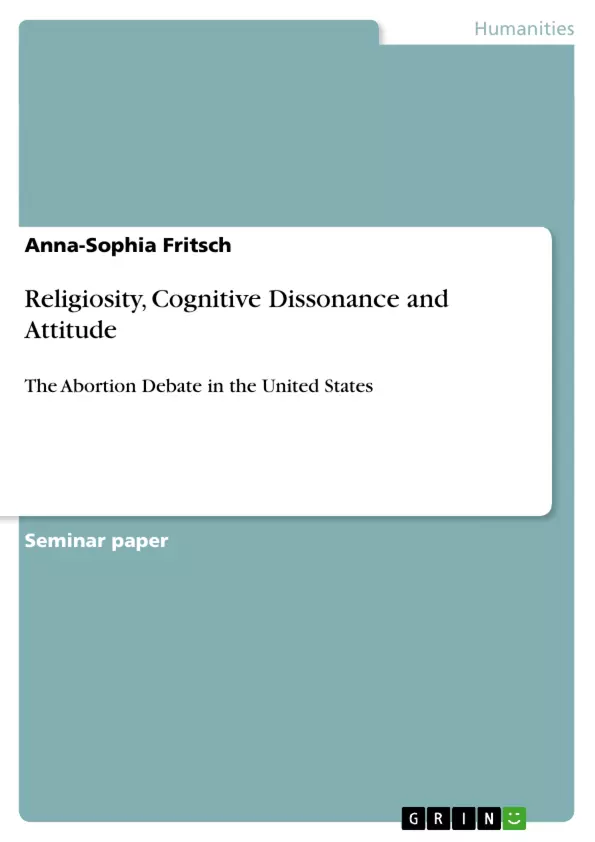In the United States of America, a high degree of attention has been paid to the issue of how to legislate abortion. During the past two decades, notions of the so-called „Culture-Wars“ emerged, referring to an increasing polarization of the American public over the abortion topic along the lines of religiously motivated „pro-life“ and secular „pro-choice“ activist groups. This paper is an effort to analyze from a psychological perspective how religiosity mediates people‘s attitudes towards abortion legislation, the hypothesis being that the more embedded a person is in an increasingly conservative religious community, the less likely she will be to experience cognitive dissonance over ambivalent topics like abortion, because she adheres to the amplified religious position on it. It was found that religiosity leads to more dismissive attitudes towards abortion in general. Furthermore, the more conservative a religious denomination is in the terms of Bible literalism, the stricter is the view of its adherents that abortion should be forbidden by law in most or all cases. As Bible literalism entails the belief of being indisputably right about any issue touched by it, it leads to attitude persistence, which keeps the „pro-life“ and „pro-choice“ activist groups from finding a compromise. However, contrary to what the „Culture-Wars“-hypothesis suggests, data from public opinion polls do not show an increasing polarization in attitudes over the issue.
Inhaltsverzeichnis (Table of Contents)
- Introduction
- The Abortion Debate in the United States
- Cognitive Dissonance
- Religiosity and Attitude towards Abortion
- Conclusion
Zielsetzung und Themenschwerpunkte (Objectives and Key Themes)
The paper aims to explore the relationship between religiosity, cognitive dissonance, and attitudes toward abortion legislation in the United States. It investigates how deeply embedded individuals are in conservative religious communities, and whether this influences their susceptibility to cognitive dissonance regarding ambivalent issues like abortion. The paper will analyze how religious beliefs, particularly Bible literalism, impact attitudes towards abortion and the potential for compromise in the "Culture Wars" surrounding this issue.
- The influence of religiosity on attitudes towards abortion legislation.
- The role of cognitive dissonance in mediating attitudes towards abortion.
- The impact of Bible literalism on attitude persistence and the "Culture Wars" surrounding abortion.
- The relationship between religious faith and the acceptance of scientific evidence on abortion.
- The implications of cognitive dissonance and religious beliefs for public policy debates on abortion.
Zusammenfassung der Kapitel (Chapter Summaries)
The introduction sets the context for the study, highlighting the ongoing debate surrounding abortion legislation in the United States. It introduces the concept of cognitive dissonance, a psychological phenomenon that explains how individuals respond to conflicting beliefs or actions.
The second chapter dives into the abortion debate, outlining the contrasting perspectives of "pro-life" and "pro-choice" activists. It examines the arguments used by each side and discusses the role of religious beliefs in shaping these stances. The chapter then delves into the concept of Bible literalism and its implications for understanding the relationship between religious faith and scientific evidence.
The third chapter explores the interaction between religiosity and attitudes towards abortion. It argues that increased Bible literalism within a congregation leads to a stronger conviction of absolute truth, potentially dismissing scientific evidence that challenges their faith or abortion-related beliefs. This can lead to a decreased susceptibility to cognitive dissonance and attitude persistence.
Schlüsselwörter (Keywords)
The main keywords and focus topics of the text include: religiosity, cognitive dissonance, abortion, abortion legislation, Bible literalism, attitude persistence, Culture Wars, pro-life, pro-choice, religious beliefs, scientific evidence, public opinion, and US-American context. The study explores how these concepts intertwine to influence individuals' attitudes towards abortion and the potential for societal change.
Frequently Asked Questions
How does religiosity affect attitudes toward abortion in the US?
Studies show that higher religiosity, especially in conservative communities, leads to more dismissive and stricter attitudes toward abortion legislation.
What is the role of Bible literalism in the "Culture Wars"?
Bible literalism fosters a belief in absolute truth, which often leads to attitude persistence and prevents compromise between pro-life and pro-choice groups.
What is cognitive dissonance in the context of this paper?
It is the psychological discomfort felt when holding conflicting beliefs. The paper hypothesizes that conservative religious embedding reduces this dissonance regarding abortion.
Does public opinion show increasing polarization on abortion?
Contrary to the "Culture Wars" hypothesis, data from public opinion polls do not necessarily show an increasing polarization over time.
How do religious groups view scientific evidence on abortion?
The paper suggests that high levels of Bible literalism may lead individuals to dismiss scientific evidence that challenges their faith-based positions.
- Citar trabajo
- Anna-Sophia Fritsch (Autor), 2011, Religiosity, Cognitive Dissonance and Attitude, Múnich, GRIN Verlag, https://www.grin.com/document/192002



